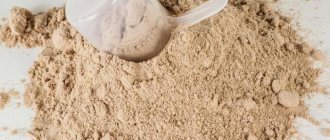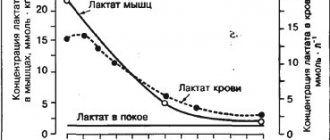How many grams of protein does one scoop of protein contain? How often should you drink it and in what dosage. It is unlikely that you will be able to achieve the desired results in bodybuilding and build an ideal body solely on food products (even very high-quality ones). Why? - Yes, because the products are not completely absorbed by the body. For example, you can eat a kilogram of pork, but only a fifth of it is absorbed by the body. It is impossible to calculate how much protein the body received in this case.
In this regard, the option with sports nutrition looks much more attractive. All you need is to buy a pack of high-quality protein, correctly calculate the dosage and time of administration. To make measurements easier, almost every complex has its own scup - a special measuring spoon. But how often should you drink protein? What time? How many grams are in scup? Let's look at these questions in more detail.
How much protein should you drink to gain weight?
How much protein should a person gaining weight take? Typically, a person needs 1 g of protein for every kilogram of their body weight. During sports activities, this norm increases to 1.2-2.2 g of protein per kilogram of body weight, depending on the type of sport and the amount of physical activity; for bodybuilders - up to 2.3-3.1 g of protein.
Interesting materials:
How many parts are there in the book The Count of Monte Cristo? How many books are there in the Warhammer universe? How many characters are there in a book of 400 pages? What is the difference between a book and a magazine? What is the meaning of the book The Boy in the Striped Pajamas? What is the meaning of The Picture of Dorian Gray? In what position should you read books? In what order should I read JK Rowling's books? In what order should I read the Metro 2033 books? In what order should I read books in the Warhammer 40,000 universe?
We pay attention to details
When planning the dosage and timing of protein intake, one important thing to consider is that there are “slow” and “fast” proteins. That is, one group of proteins is absorbed by the body in 5-7 hours, and the other in 20-50 minutes. The difference is significant, you will agree. Now for examples.
One of the most popular and sought after supplements among bodybuilders is whey protein. The main reason is the high percentage of protein (in isolate it can reach 95%), excellent digestibility by the body (from 20 to 50 minutes) and a rich composition of amino acids, which is so necessary for muscle fibers for growth and recovery. If you need to quickly charge and “nourish” the body after a workout, whey “fast” protein comes to the rescue.
In turn, casein and soy proteins are “slow” - the body absorbs them within 5-7 hours. But this does not mean that their composition is worse than that of their competitors. Not at all. The whole difference is in the structure of the protein, which is difficult to break down in the stomach. But if taken correctly, this is more of a plus than a minus. Eating “slow” protein is a chance to stop catabolic processes in the body and provide muscles with amino acids for many hours to come.
Regular food or sports drink?
Of course, natural, fresh food is always better. But there is NO NEED to use sports supplements INSTEAD of your usual food, there is no such task.
Sports nutritional supplements are just an aid, an addition to your main diet. If you have the opportunity to eat well and nutritiously, then you can do without sports nutritional supplements at all. Although, for example, vitamins will be useful in any case.
Unlike chemistry, sports supplements do not contain prohibited drugs, they are not doping agents and are approved to improve the nutrition of athletes. Because sports nutrition (sports nutrition) is just substances that provide the body with a large amount of proteins, carbohydrates, vitamins and other important elements.
DO NOT BE UPset if you do not have the opportunity to purchase, for example, protein - if you eat enough protein, then you absolutely do not need it.
Sports nutrition is not magic, it is not a guarantee of success, it is not a prerequisite for a beautiful body - it is an excellent assistant and improves results by 10-20%. Without a balanced diet and working hard in the gym, nothing will come of it; drink protein at least a hundred times a day.
And now we return to our sheep and our topic - protein.
A portion
It is known that the human body is capable of absorbing no more than 40-50 grams of protein at one time. Therefore, sports nutrition manufacturers leave “measuring spoons” in packages with protein mixtures, with which you can measure your portion of protein. But if you didn’t find the measure in the bag with the mixture, then two ordinary tablespoons of powder can serve as a guide. A standard portion of a protein mixture (30-35 grams) contains approximately 80% of the protein itself, and if you consider that you will most likely dissolve the powder in milk, then the amount of protein taken can be about 35-40 grams, which is a one-time norm.
Thus, fast whey protein is not only recommended, but simply and necessary to take in the morning after sleep, before classes and immediately after training in the gym. It is then that a 30-35 gram portion of protein powder can become a source of strength and necessary energy for your growing body.
Protein is rightfully considered one of the most popular sports supplements, it is used by almost all athletes, regardless of the purpose of training: to gain muscle mass, to “get dry”, to get a sculpted torso, and so on - in each case protein is used, the differences are only in dosage, time reception and several other factors. There can be only two problems with taking protein: an incorrectly selected mixture and an incorrect dosage. Next, we will try to understand the types of protein concentrates and answer three questions: how to measure protein without a measuring spoon, does an athlete need a measuring device, and how many grams are in .
Reception features
Now let’s figure out how much and when to drink protein. So, we already mentioned that scup is a measuring spoon that is often sold along with a sports supplement. With its help, it is easier to dose portions and distribute the composition correctly throughout the day. How many grams are in 1 scoop? There is no clear answer here - protein powders often have different weights. On average, 1 scoop is about 25-30 grams of protein powder, that is, one serving.
Professional athletes recommend drinking protein in five doses, which is what we will do:
- Early in the morning. After waking up, the body needs to be given the first portion of high-quality protein in order to stop the destructive process of catabolism and provide a new supply of protein. During this period, the best option is to take 1 scoop of “fast” whey protein.
- Before going to the gym. There is an active and hard workout ahead, so the muscles need to be given the full amount of amino acids and beneficial microelements. Therefore, 40-60 minutes before going to the gym you need to drink 0.5-1 scoop of whey protein. The latter is well absorbed and manages to supply muscle cells with a full supply of amino acids.
- After the gym, the body is exhausted and needs to replenish its reserves. That is why in the first 40-60 minutes he should receive his increased portion of protein in the amount of 1-2 scoops. As for the type of supplement, the best option here is whey protein.
- Between meals, sports nutrition is also necessary, but in a smaller dosage. Thanks to the supply of amino acids, the synthesis process in muscle fibers continues throughout the day. In addition, taking protein helps reduce appetite, which is important for athletes who are losing weight. In the periods between meals, you can drink ½ scoop of both “slow” and “fast” protein (here it all depends on the goals).
- The last portion is taken immediately before bedtime. Here it is necessary to give preference to “slow” proteins, for example, casein or soy protein. They provide amino acids to the muscles throughout the night. In addition, thanks to the constant supply of amino acids, the danger of catalytic processes is eliminated. One scoop of protein at night is enough to “hold on” until the morning.
How to calculate the amount of powder?
There is another way to measure protein - a measuring spoon: how many grams of powder fits in it
? Manufacturers put it in packaging for ease of use, so just 30 g of dry matter is placed in it. This allows you to simplify the preparation process, since exactly one spoon is enough to prepare a portion of a nutritional shake.
Any formulations are taken immediately after preparation: they should not be left in the refrigerator, as they quickly lose their nutritional properties. Many of them create a feeling of satiety, so a person does not feel hungry for several hours, which is important for those losing weight.
conclusions
Thus, with proper consumption of protein powder, you can achieve better results - increasing muscle mass, increasing strength and endurance, improving muscle definition and getting rid of excess fat deposits. Good luck.
Protein is the leader in sports nutrition. Protein (or in simple words protein) is an organic substance that contains carbon, hydrogen, oxygen and nitrogen.
It supplies the human body with necessary chemical elements. Protein is distinguished from other organic substances by the presence of nitrogen in it.
Protein is present in meat, fish, cottage cheese and other foods. Protein in the human body contains twenty amino acids. Ten of them are irreplaceable
. That is, the human body is not able to synthesize their independence, the remaining ten are replaceable. After protein enters the body, it is broken down into amino acids. Proteins are necessary for the growth and development of muscle tissue, bone structure, etc.
Types of protein
Protein can be found in the form of a powder concentrate containing high-quality protein, as well as in the form of a protein shake.
Currently, there are different types of proteins: whey, egg, casein
, soy and others.
Athletes often purchase whey protein. Contrary to popular belief, it does not have chemical additives. It is obtained from ordinary whey. Protein is equipped with important biological value and is quickly absorbed. Whey protein should be consumed after workouts.
Egg protein is digested within 3-4 hours
Casein protein does not mix well in water and is poorly absorbed in the body. Its biological value is 80%. It is advisable to take this protein before bed, but there is no point in consuming it after training.
Soy protein is difficult to digest, but can lower blood cholesterol levels.
Thus, each protein has its own advantages and disadvantages.
On sale you can find complex proteins that are very useful. It is important to know that proteins come from natural products.
Protein measuring spoon
Don't forget about eating rationally. Protein can be taken daily.
When is the best time to take supplements?
A protein shake is a useful nutritional supplement that allows you to fill the lack of protein in your diet. Proper use and reasonable dosage will help you get effective results. Once you understand how many grams of protein can be contained in a scoop or tablespoon, it is important to decide when to take your supplements.
The daily dose is divided into several servings: fast protein
taken before training and after active exercise, and slow
should be consumed before bed to avoid starvation during the most active muscle growth.
It is recommended to take any supplements no later than an hour before the start of training, since it is better to exercise on an empty stomach so that nothing interferes with the process. For those who want to lose weight, taking a protein shake should replace a regular meal. Due to its minimal fat content, it will help adjust body volume. In this case, isolate will be the optimal solution, since it contains almost pure protein.
In sports clubs there is an opinion that: “only 30 grams of protein are absorbed at a time, no more is absorbed”…. Sometimes they talk about 35 grams or 40…. I often hear such statements and see them on the Internet.
However, if you ask in more detail:
Why exactly is it not absorbed? Why exactly 30 grams, why not 33?
After these questions the answer is vague. I’m already silent about the fact that people who say this often have no idea at all about the digestive system and protein metabolism in the body. So, we will analyze this protein myth.
1. Let’s compare a person with a height of 165 cm and a weight of 55 kg and a person with a height of 190 cm/105 kg. Do they have the same blood volume, the same muscle mass, the same intestinal and liver sizes... or are they different?
Now suppose that one plays sports and has an increased demand for proteins in his muscle cells, and the other has a sedentary lifestyle... do you feel a hint? Where, in this case, did the even, uniform value of 30 grams come from?
2. digestion and assimilation of proteins, and any other substances, are complex multi-stage processes involving hormones, enzymes and many body systems.
When you eat, your digestive system begins to work actively and gradually digests and absorbs almost any amount of food you eat (hence the problem of obesity.
Of course, if you are so full that you cannot move, then it is difficult for the body to digest such an amount of food at once, but this is the other extreme. You can fill your stomach to the point of nausea... I don’t consider senile situations.
To increase muscle mass, and generally for health, you need to eat well, but evenly. Distribute meals into 4-5 meals throughout the day.
The quality of food absorption will depend on the quality of the food, the method of preparation, your health and the state of the body at the moment.
3. Now about the proteins themselves. After all, they do not enter the blood instantly; first they need to be “Digested,” that is, broken down into amino acids, and this takes time. That is, proteins are absorbed gradually, and the speed of digestion depends on the type of protein and the foods you eat.
Even if you take 50 grams of “Clean” protein in the form of sports nutrition, it will be absorbed gradually over several hours. And what can we say about normal foods - meat, cottage cheese, eggs, cereals, they take even longer to digest.
The process of digestion and assimilation of proteins is a multi-hour process that occurs not, attention, only in the stomach, but throughout the entire intestine.
This means that when you eat a new food, the digestion and absorption of proteins from the previous meal are still ongoing in the intestines - and this is a normal situation. You just never thought about it, and in general, you don’t need to worry about it...
What does it mean, in this case, “30 grams at a time”? This is a very conditional and vague concept - there is no “One Time”. All proteins taken are digested and absorbed gradually over a long period of time.
4. Now let's look at ordinary food products.
150 gr. lean beef is already about 30 grams. Squirrel, only 200 gr. Low-fat cottage cheese is 36 grams. Squirrel, tuna 140 gr. - 30 gr. squirrel ….
A liter of milk contains almost 30 grams of valuable proteins, and that’s it, you can’t eat anything else, it won’t be absorbed? Go ahead and make any athlete laugh... I remind you that to gain muscle mass and develop strength, it is advisable to consume 2 grams of protein per kilogram of body weight per day.
From my point of view, the statement “30 grams of Protein is absorbed at a time” is not a scientific fact, but a folk myth. Everything is perfectly digestible, that’s what the digestive system is for! Naturally, if there are no diseases.
Eat varied, well and evenly. Don't eat until your stomach hurts.
During heavy physical activity, the body needs increased amounts of proteins. For example, I eat 400 grams. Low-fat cottage cheese (protein content 18 grams per 100 grams of cottage cheese) yields 72 grams of protein... and useful information is perfectly absorbed, save it for yourself.
Whey Protein
– one of the most popular and widespread types of protein mixtures. It is an indispensable assistant for all athletes, and not only for weightlifters and bodybuilders. It is taken by both professionals and beginners, those who burn fat and those who gain muscle mass.
This is an absolutely harmless form of sports nutrition, however, for maximum benefit and effect, whey protein must be taken correctly.
After sleep
When you wake up, your body begins to switch from night to day mode. His energy consumption and nutrient demands increase sharply. It begins to “scan” all possible sources of protein and, if it does not find it in the stomach, it will definitely find it in muscle tissue. It is in order to prevent muscle breakdown and urgently replenish protein reserves that it is recommended to drink a protein shake in the morning after sleep. At least until breakfast, it will satisfy your body’s morning appetite and provide all processes with the necessary protein.
How not to make a mistake when calculating?
A tablespoon that can be used to prepare protein holds 15 grams (heaped). To prepare an average single dose, you will need two tablespoons of dry matter, which can be dissolved with water, milk, juice, etc. The liquid should not be hot, otherwise the protein will begin to denature, and therefore will not bring all the benefits.
How much protein can a regular teaspoon contain?
It can also be used for making cocktails: it will hold 5 g of dry powder (with a slide), that is, you will need six teaspoons for a single dose.
When calculating dosage, it is important to consider how many grams of protein are in the protein. No supplement can consist only of protein compounds; usually their amount fluctuates around 70%. This means that 100 g of such a pure protein shake will contain only 70 g, so the dosage of dry powder must be increased.
The richest variety in proteins is isolate - its amount can reach up to 95%. Having figured out how many grams a spoonful of protein can contain, it is important to consider the protein content of regular food. If your diet includes meat, fish, eggs and dairy products, it is better to reduce the number of protein shakes you take so as not to burden your kidneys.











